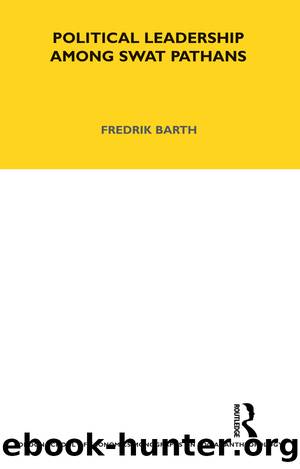Political Leadership Among Swat Pathans by Fredrik Barth

Author:Fredrik Barth [Barth, Fredrik]
Language: eng
Format: epub
Tags: Social Science, Anthropology, General, Research, Gender Studies
ISBN: 9781000324488
Google: Etz7DwAAQBAJ
Publisher: Routledge
Published: 2020-09-08T05:03:58+00:00
THE CHIEFâS SOURCES OF AUTHORITY
The title of KhÄn, chief, even apart from its extended courtesy use, does not denote incumbency M any formal office. There is no recognised hierarchy of positions to be filled by successful pretenders. The title merely implies a claim to authority over others; it is a statement of a personâs willingness to lead. Chiefs compete with each other for followers. The main sources of influence over followers are control of the sources of livelihood, the distribution of wealth, martial valour in defence of the family honour, and also in some areas, an organizational device known as the tâlgeri system.
Land forms the basis for the whole system of organization in Swat. Quite apart from the profits it supplies in the form of rent, its owner, by his mere possession, gains authority and control over numerous persons. The whole population of Swat is directly dependent on land in some form or other; and non-landowners can only gain access to it through agreements with landowners. The two important categories of land in the present context are dwellings and agricultural land. A dwelling in this sense is known as a kÅá¹a, and consists of a house-site in the village area, and at least the four walls of the house structure. The roof-beams are private movable property, and are often removed if the dwelling changes hands. Every family must have a dwelling of this kind, and persons who do not own land obtain one through a house tenancy contract (pp. 5off). Such a contract places the tenant in a relation of dependence on the owner; it also gives the owner a certain political authority over the tenant, who becomes his client for administrative purposes. But the tie of clientage is not exclusive; the house tenant may seek other political patrons for protection against the house-owner. Nevertheless, the house-owner is in a clear position of political dominance over the tenant. The possession of agricultural land is a political asset in the same way. Though no political clientage is implied in land tenancy contracts (p. 44), the tenant depends on the land for his livelihood, and the power of eviction gives the landowner a hold on him.
The ownership of land is thus a direct source of political influence. An increase in land holdings implies an increase in such influence; indeed the possession of extensive lands is a basic requirement for any kind of security in a position of ascendancy. The competition between chiefs is thus largely for the control of land, and the acquisition of land is an important move in a political ascent. Land may be obtained in four ways: by inheritance, as a reward for political service, by purchase, or by violence or threats. These four methods merit some attention.
Real property passes in inheritance from a man to his closest agnatic relatives in the order: son, father, sonâs son, fatherâs father, brother, fatherâs brother, brotherâs son, fatherâs brotherâs son. The presence of a person in any one category excludes the succeeding
Download
This site does not store any files on its server. We only index and link to content provided by other sites. Please contact the content providers to delete copyright contents if any and email us, we'll remove relevant links or contents immediately.
| Central Asia | Southeast Asia |
| China | Hong Kong |
| India | Japan |
| Korea | Pakistan |
| Philippines | Russia |
The Rape of Nanking by Iris Chang(3522)
The Sympathizer by Viet Thanh Nguyen(3501)
World without end by Ken Follett(3009)
Ants Among Elephants by Sujatha Gidla(2927)
Blood and Sand by Alex Von Tunzelmann(2611)
Japanese Design by Patricia J. Graham(2560)
City of Djinns: a year in Delhi by William Dalrymple(2138)
Inglorious Empire by Shashi Tharoor(2103)
In Order to Live: A North Korean Girl's Journey to Freedom by Yeonmi Park(2059)
Foreign Devils on the Silk Road: The Search for the Lost Treasures of Central Asia by Peter Hopkirk(2058)
Tokyo by Rob Goss(2021)
India's biggest cover-up by Dhar Anuj(1988)
India's Ancient Past by R.S. Sharma(1988)
The Great Game: On Secret Service in High Asia by Peter Hopkirk(1962)
Tokyo Geek's Guide: Manga, Anime, Gaming, Cosplay, Toys, Idols & More - The Ultimate Guide to Japan's Otaku Culture by Simone Gianni(1949)
Goodbye Madame Butterfly(1938)
The Queen of Nothing by Holly Black(1758)
Living Silence in Burma by Christina Fink(1732)
Batik by Rudolf Smend(1723)
